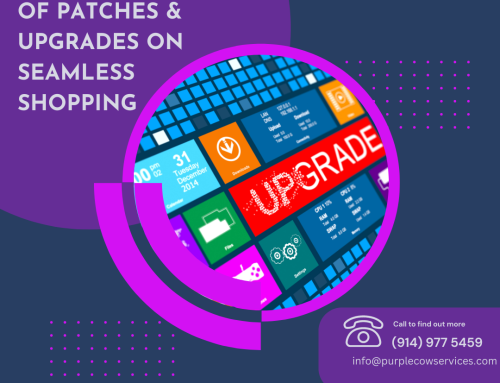As eCommerce continues to dominate the retail industry, the demand for cutting-edge technology and enhanced user experiences has never been greater. One of the key factors that has contributed to the success of eCommerce is the ability to quickly and easily make updates and upgrades to websites and platforms. In this blog post, we will explore the future of eCommerce patches and upgrades, and what businesses can expect in the years to come.
Share This Story, Choose Your Platform!
The Evolution of eCommerce Patches and Upgrades
When eCommerce first emerged as a major player in the retail industry, patches and upgrades were relatively simple affairs. Updates were released periodically to fix bugs, improve security, and add minor features to websites and platforms.
Over time, however, eCommerce patches and upgrades have become increasingly sophisticated. Today, businesses can make changes to their websites and platforms that would have been unthinkable just a few years ago.
For example, businesses can now use artificial intelligence (AI) to personalize the shopping experience for each individual customer. They can also use machine learning algorithms to optimize pricing, manage inventory, and streamline the checkout process.
The Future of eCommerce Patches and Upgrades
So, what can businesses expect in the future of eCommerce patches and upgrades? Here are a few key trends to keep an eye on:
Increased Emphasis on Personalization
As eCommerce becomes more competitive, businesses will need to find new ways to stand out from the crowd. One of the most effective ways to do this is through personalized experiences that cater to the unique needs and preferences of each individual customer.
In the future, eCommerce patches and upgrades will likely focus heavily on personalization. Businesses will use AI and machine learning to create customized product recommendations, personalized email campaigns, and tailored shopping experiences that are unique to each individual customer.
Enhanced Mobile Capabilities
As more and more consumers turn to their mobile devices to make purchases, eCommerce platforms will need to become more mobile-friendly. This means creating websites and platforms that are optimized for mobile devices, with easy-to-use interfaces, streamlined checkout processes, and fast load times.
In the future, eCommerce patches and upgrades will likely focus on enhancing mobile capabilities. Businesses will invest in technologies like progressive web apps (PWAs) and accelerated mobile pages (AMPs) to create fast, responsive, and user-friendly mobile experiences.
Integration with Emerging Technologies
As new technologies continue to emerge, eCommerce platforms will need to adapt to keep pace. This means integrating with emerging technologies like virtual reality (VR), augmented reality (AR), and voice assistants like Alexa and Google Assistant.
In the future, eCommerce patches and upgrades will likely focus on integrating with these emerging technologies. Businesses will use VR and AR to create immersive shopping experiences, while voice assistants will be used to enable hands-free shopping and product search.
Enhanced Security Features
As cyber attacks become increasingly common, eCommerce platforms will need to invest heavily in security features. This means implementing robust security protocols, using encryption technologies, and regularly releasing security patches and updates.
In the future, eCommerce patches and upgrades will likely focus heavily on enhanced security features. Businesses will use machine learning algorithms to detect and prevent cyber attacks, while implementing multi-factor authentication and other advanced security measures to keep customer data safe.
Greater Use of Data Analytics
As eCommerce becomes more data-driven, businesses will need to find new ways to collect, analyze, and use data to drive growth and improve the customer experience. This means investing in technologies like predictive analytics, customer data platforms (CDPs), and business intelligence (BI) tools.
In the future, eCommerce patches and upgrades will likely focus heavily on data analytics. Businesses will use AI and machine learning to analyze customer data and gain insights into consumer behavior, preferences, and trends. This data will be used to drive personalized experiences, optimize pricing, and improve overall business performance.
Final Thoughts
As eCommerce continues to grow and evolve, businesses will need to stay ahead of the curve by investing in cutting-edge technologies and embracing the latest trends in eCommerce patches and upgrades. By focusing on personalization, enhancing mobile capabilities, integrating with emerging technologies, enhancing security features, and using data analytics to drive growth, businesses can create unique and engaging shopping experiences that set them apart from the competition.
In the years to come, we can expect to see even more exciting developments in the world of eCommerce patches and upgrades. From the continued use of AI and machine learning to the integration of new technologies like VR and AR, the future of eCommerce is bright and full of possibilities. As businesses adapt to these changes and embrace the latest technologies, they will thrive in the fast-paced and ever-changing world of eCommerce.
Introducing Purple Cow – the revolutionary service that will transform the way you think about eCommerce! Our innovative approach is like nothing you’ve ever seen before, with cutting-edge eCommerce technical support, that will make your brand stand out in a sea of mediocrity. With Purple Cow, your online store will be up to date on everything including patches and upgrades. Don’t settle for ordinary – go for something extraordinary with Purple Cow.
Share This Story, Choose Your Platform!
In This Blog:

















